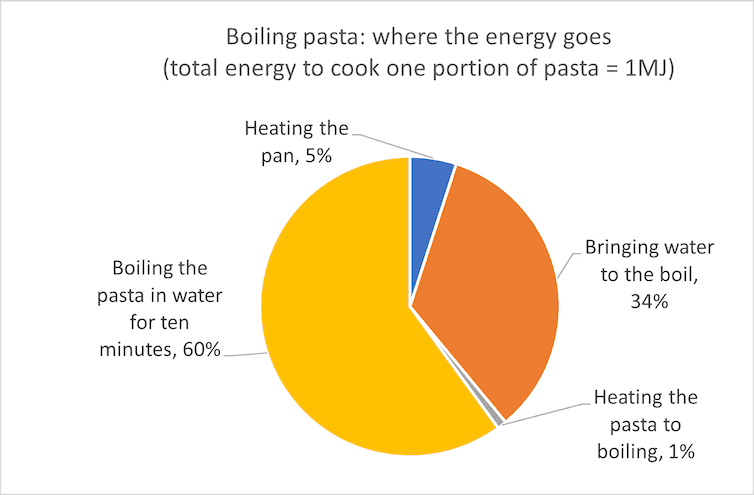![]()
Italians are notoriously – and understandably – protective of their cuisine, as regular arguments about the correct toppings for pizza or the appropriate pasta to use with a Bolognese ragu will attest.
So it was hardly surprising that, when a Nobel Prize-winning Italian physicist weighed in with advice about how to cook pasta perfectly which seemed to upend everything the countries’ cooks had been doing in the kitchen for centuries, it caused an almighty row.
Professor Giorgio Parisi – who won the 2021 physics Nobel for “the discovery of the interplay of disorder and fluctuations in physical systems from atomic to planetary scales” – suggested that turning off the heat midway through cooking pasta, then covering with a lid and waiting for the residual heat in the water to finish the job, can help reduce the cost of cooking pasta.
In response, Michelin-starred chef Antonello Colonna claimed this method makes the pasta rubbery, and that it could never be served in a high-quality restaurant such as his own. The controversy quickly spilled over into the media, with several food and science heavyweights contributing.
But for those of us at home trying to save our pennies while cooking pasta, is Parisi’s method really cost effective? And does it really taste that bad? Inspired by the thought of saving some money, students Mia and Ross at Nottingham Trent University took to the kitchen to cook pasta in different ways, helping to pick apart the tangled strands of this question.
What happens when you cook pasta?
The first thing to ask is what actually happens when we cook pasta. In the case of dried pasta, there are actually two processes which typically take place in parallel. Firstly, water penetrates the pasta, rehydrating and softening it within ten minutes in boiling water. Secondly, the pasta heats up, causing the proteins to expand and become edible.
The standard cooking method plunges 100g pasta into 1 litre of boiling water for ten to 12 minutes, depending on its thickness. The breakdown of energy use is depicted in the graphic below, which can be converted into a total cost using information on the price of energy and the efficiency of the stove.
At today’s prices, the cost of cooking dried pasta on a ceramic hob comes in at 12.7p per serving, an induction hob at 10.6p, and a gas hob at 7p. So given the UK’s love of pasta, with on average everyone eating one portion per week, we are spending £4,690,000 a week on cooking pasta.

It is clear from the graphic that around 60% of the energy is used to keep the water boiling. So anything that can be done to reduce the cooking time would have a significant impact on the overall cost. Parisi’s method of turning off the hob midway and allowing the pasta to cook in the residual heat will halve the cooking cost, a saving of around 3p. This method will be even more effective on ceramic hobs as unlike gas and induction, they are slow to cool down.
However, by separating the processes of rehydration and heating, it is possible to reduce the cost even further. Dried pasta can be fully rehydrated by pre-soaking it in cold water for two hours. This is a process that requires no energy at all and saves an additional 3p.
The pasta then needs to be dropped into boiling water to heat it through – and there are further savings to be made here too. Chefs, bloggers and scientists report that the quality of the cooked pasta is unaffected by significantly reducing the amount of water. We found that halving the water resulted in perfect pasta, but reducing to one-third was unsatisfactory. Starch is released during cooking and if there is insufficient water the concentration builds up, leaving clumps of unevenly cooked pasta – although regular stirring of the pot may well improve matters.
The graphic shows that the second-largest energy requirement is from bringing the water to the boil. Again, there is another saving to be made here.
It turns out that the granules of protein in pasta dissolve above 80ºC, so there is no need to bring the pan to a “rolling boil” at 100ºC, as is often advised. Gentle simmering is sufficient to cook the pasta completely, providing an additional saving of around 0.5p.
We also investigated using a microwave to heat the pre-soaked pasta. Microwaves are very efficient at heating water, but in our experiments this produced the worst pasta of all. Definitely not one to try at home.
How to do it – and save money
The prize for the most efficient method of cooking dried pasta is to pre-soak it in cold water before adding it to a pan of simmering water or sauce for one to two minutes. Keeping a lid on the pan is another simple thing you can do. Adding salt, while making minimal difference to the boiling point, does significantly improve the taste.
We aren’t all Michelin-starred chefs or Nobel Prize-winning physicists, but we can all make a difference in the way we cook to reduce energy bills while still producing great-tasting food. Now it’s up to you to experiment with these methods until you find a combination that makes your cooking more economical while also saving your pennes.
The author would like to thanks his students Mia London and Ross Broadhurst for their assistance in compiling this research.
David Fairhurst, Principal Lecturer, College of Arts and Science, School of Science & Technology, Nottingham Trent University
This article is republished from The Conversation under a Creative Commons license. Read the original article.
Source Link: Nobel-Prize Winning Physicist Explains How Best To Cook Pasta And Nobody Agrees